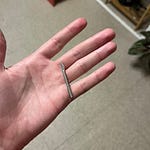If I seem to you like the kind of person who would happily cut someone out of my life for crossing a line, congratulations—you’ve got me dead to rights.
I’m aware that this is not necessarily a healthy quality. In my case, it can be reactionary or arbitrary. The camel’s-back-breaking offense can be unfairly weighted with petty variables like past resentments, hormonal imbalance, a bad cup of coffee. And it can arrive without warning, both for me and for the person who somehow ended up on the wrong side of my sandbox.
Don’t get me wrong. Being able to set boundaries for my own safety and happiness is a hard-earned skill that I cherish; I’ve not always been the kind of person that was willing to protect myself. But it would be dishonest to say that I don’t sometimes overcorrect, or that haven’t I’ve gone on to regret my overcorrections. There are people I know I will never talk to again, even though I recognize, in the comfort of hindsight, that they weren’t as dangerous or unforgivable as I felt they were when I kicked them off the emotional premises. There are people that have no idea why I stopped talking to them, and though I could—maybe even should—explain myself, I know I never will. That ship has sunk, is how I think of it. If you’re not in my life, I obviously didn’t need you, anyway. Not that I need anyone at all. The vast majority of the people that I have eliminated from my life were fucking around and finding out, as they say, but I can admit that avoidance is a lot easier than managing conflict, and that of the two, only one offers the potential for vulnerability and growth.
As a result of this penchant for taking out the trash, I’m one of those lucky gay people that has had very few heteros in their day-to-day life for many years. It’s not my intention to be categorical, but since I won’t tolerate disrespect from someone who’s not paying my rent1 …well, you know how straight people are.
It’s not just homophobia or transphobia. It’s (and of course I’m generalizing here, etc. etc. etc.) their general tolerance for authoritarianism; their willingness to disregard others’ discomfort, fear, or pain if it means smoothing over a social situation or bolstering their status; their inability to recognize survivor concepts like chosen family for what they are—worst-case scenarios, to which many of us were driven against our will. This reflects a compounding entitlement that pads their days and their years, their relationships with their natal families and other oppressive institutions, their opportunities and their limitations, their health and their lack thereof. If I am to understand that you will not defend me to your friend when she wonders if maybe I’m a disgusting unnatural freak; that you won’t bring me around your straight boyfriend because you’re afraid of what he will say to me—but not enough to do something about his behavior; that you aren’t willing to end a relationship with a fascist who cannot be convinced of life’s value, even if that fascist is a blood relative that you love very much, then you will not enjoy intimacy with me. If this means that as a result straight people, and straight-acting people, are by and large vanished from my life, well. It is what it is.
What I’m saying is, my general separation from straight people has more to do with cultural differences than individual fault. Which means that it’s possible for straight people to change. Some of them, maybe even many of them, having benefited from the alternation of hand-holding and boundaries of gays like me, will later enter into the orbits of other homos who find them to be well-mannered, even comradely. (I’m sure that something similar has happened with me and other people as I’ve gotten older and learned some of the contours of, for example, my racism.) This is solidarity, and it transcends identity and difference, thrives on them, in fact, and it is beautiful. May we all get there someday. May we all overcome ourselves.
But it also means that my tolerance for straight people has wasted away. Outside of my remote 9-5 job or going the doctor, I really don’t have to deal with them in any sustained way2. And so when there is a circumstance where I am forced to deal with one and as a result am harmed or disrespected, I’m shocked by my response. No matter how small the incident, I’m outraged. I lose sleep. I rave about it to whomever will listen. I stew. I grow a pungent new resentment like a blister, rice-papering it with so many layers of skin that it becomes a callus, pregnant with blood and spleen, indefatigable and yet tender. It’s a boil. It’s a lesion. It’s a carbuncle square on my ass. And I can’t lance it or ignore it or chew on it til it bursts. It’s just down there, infuriating me.
My parents divorced when I was young, and even at the best of times, their relationship was never good. Though my dad had many faults—some of them normal straight white guy things and some of them weird as shit—my mom always claimed that there was a core to his intolerability. “He’s prideful,” she would say. “His pride won’t let him budge an inch on anything.” The older I get, the more I understand why. What my mom saw as my dad’s fundamental inflexibility was, in his mind, a refusal to accept contempt. Of course, he didn’t reckon that his grasping for dignity was, ultimately, undignified. I guess they were both right.
Find me on Twitter. Cop my second novel, X, right here.
Subscribe to support GOOD ADVICE/BAD GAY, DAVID’s advice series from an anonymous gay therapist who’s not afraid to hurt your feelings with the truth. (Sample an unlocked post for a taste of what you’re missing.) 100% of funds go to support a rotating selection of mutual aid and reparations projects.
Want advice? Email badgayadvice@gmail.com for a free 3-month subscription.
There are a few notable exceptions that it would be indiscreet to get into here.
I think often, too, about the ways in which having figured out a life for myself without the support of my natal family is in itself a reflection of what we may call privilege of varying kinds.












